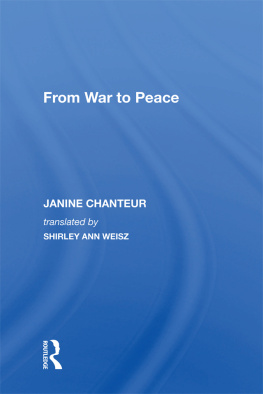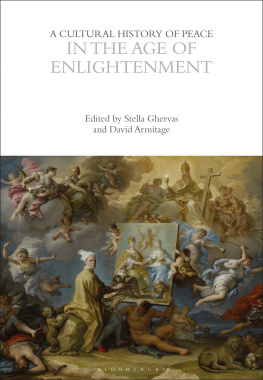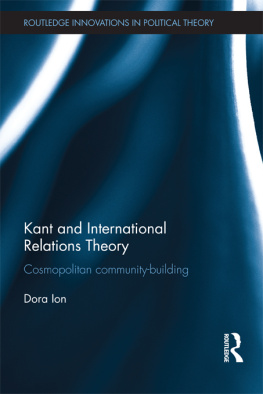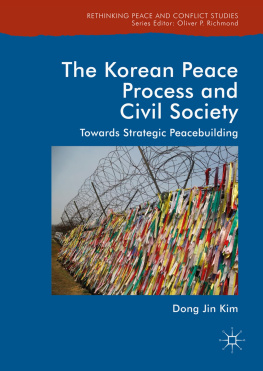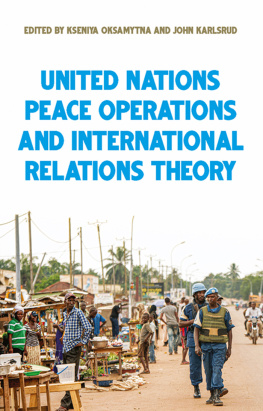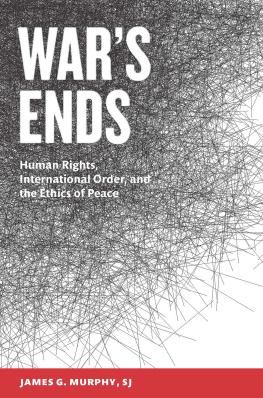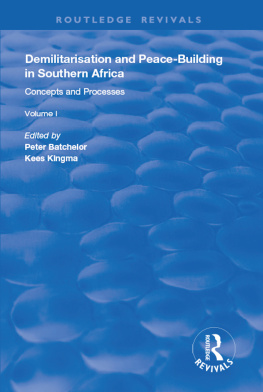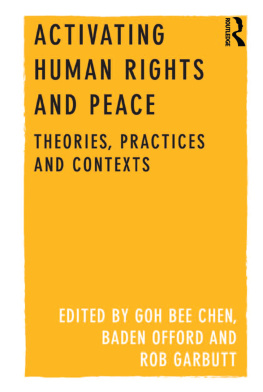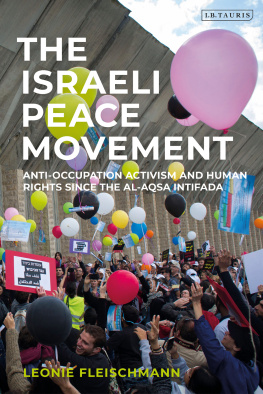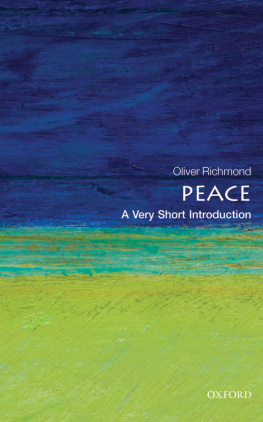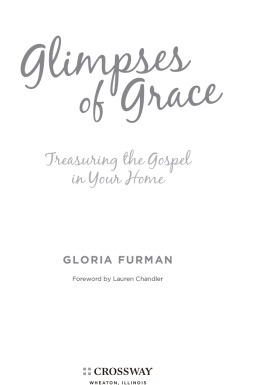First published 1989 by Westview Press
Published 2018 by Routledge
52 Vanderbilt Avenue, New York, NY 10017
2 Park Square, Milton Park, Abingdon, Oxon OX14 4RN
Routledge is an imprint of the Taylor & Francis Group, an informa business
French edition copyright 1989 by Presses Universitaires de France
All rights reserved. No part of this book may be reprinted or reproduced or utilised in any form or by any electronic, mechanical, or other means, now known or hereafter invented, including photocopying and recording, or in any information storage or retrieval system, without permission in writing from the publishers.
Notice:
Product or corporate names may be trademarks or registered trademarks, and are used only for identification and explanation without intent to infringe.
Library of Congress Cataloging-in-Publication Data
Chanteur, Janine.
[De la guerre la paix. English]
From war to peace / Janine Chanteur; translated by Shirley Ann Weisz.
p. cm.
Translation of: De la guerre la paix.
Includes bibliographical references and index.
ISBN 0-8133-1257-4. ISBN 0-8133-1258-2 (paperback).
1. Peace (Philosophy) 2. War (Philosophy) I. Title.
B105.P4C43 1992
327.172dc20 92-7818
CIP
ISBN 13: 978-0-367-00405-7 (hbk)
This project has a double ancestry. The message I received from the Greeks combined within me, a child of the Christian, rationalist West, with the discovery I made of the wealth of meanings latent in the Old Testament. This was a true discovery, made in spite of conventions that rarely inquire about what they fail to know. Like many who "have faith" and who do not "have faith," I was familiar with the tragicomic story of the apple that our primal parents bequeathed us as a questionable gift. I also knew a few other stories. But the metaphysical significance of a text, its living word, does not yield itself to a half-hearted listener.
One day, partly by chance, the Middle Eastern roots of my own civilization no longer seemed to me a dead past but began to fill me with an inexhaustible nourishment for which I had had a long-standing thirst without knowing it. Yet the rootstock of Hellenism did not wither. To become who we are, we must, I believe, consecrate within ourselves the union of our father and mother. I therefore try to celebrate the marriage of my Jewish and Hellenic "parents." This is the path I follow. It is hard to do, for I must avoid the pitfalls of excluding one voice, suppressing the other, or falsely assimilating them to each other. To hear without distortionand then integratetwo voices that on first analysis seem to have no natural vocation for union is a task not without conflict. For that matter, war and peace, whatever you take them to be, are my life experienceare indeed my life. Each of us, I think, could say the same. The question of their relationship confronts me; I can neither escape it nor answer it.
But my personal history aside, my concern here is to clarify elements of the political domain. Why write yet another book on war and peace, unless in an attempt to ask questions without prejudging the answer? Certainly, we must not invent an answer particular to the historical juncture at which we find ourselves. But can we discover an answer that will lead to helpful innovations? Or have we perhaps always known the answer without recognizing it as such? This, then, is my taskto tease out answers, to make them explicit and timely, yet to avoid the inflexibility of dogma, that marriage of bias and poor memory; to dare nonetheless to "tear open the silent portals/Past which all creatures slink in silent dread"; for to seek understanding of war and peace is to encounter, whether we wish to or not, the mystery of life and death. Our resources are few: as much good faith as we can muster and the effort to avoid selfdeception so that we may hear clearly even the most discordant voices.
Now I had to tear myself away from Plato and to accept seeing things by the light of other lamps than his. We must separate ourselves from serene childhood and even from a source of happiness if it also holds us prisoner.
I know it is not customary to speak of oneself in philosophical works, let alone of one's loves and crises. Still, let me explain myself a little. The religious education I received in a somewhat puritanical Christian family filled me with the truth of the equivalence of soma and sema [body and grave]. My soul, which I believed to be the whole of my real self, expected bliss beyond imagining after deathwhich would, however, assign this wretched, this shameful body to a perfectly real grave. The dissociation of matter and spirit and the worth assigned their separation caused me to be a harsh judge of the delights of "my five senses and some others," as Guillaume Apollinaire puts it. Though I could not believe I would have to die, I harbored an ineffable confidence that pure happiness would be found in the afterlife. When Plato captivated my mind, my heart, and my senses (to reverse the order of the Symposium), he helped me endure the burden of the Fall: a body of clay, female on top of that, disgrace. It was a use for the myth of Er and the myth of the Phaedrus that Plato could hardly have foreseen. Ignorant of my own ignorance, I could exclaim with Saint Paul, "Who shall deliver me from the body of this death?" I aspired to a peace that could be perpetual for the soul alone, and I considered the contraries of war and peace to be the necessary and irrevocable worldly condition of those suffering the awkward pairing of body and soul, whom only that other pairing, thought and understanding, came to comfort.
I would probably have been satisfied with a dualistic, impoverishing interpretation of Plato had I not discovered, in the course of a long journey, that in the here and now the body and soul are not dual. The cost was onerous, for departure from early allegiances and the furrows of habit remains unthinkable for a long time. Yet hope regarding this earthly life has risen within me; it rests on the adventure that began for those of us who have succeeded in leaving father and mother, as Scripture prescribes, and in contemplating ourselves as that indissolubly earthly and spiritual reality that constitutes a human being. Then peace will not be a Utopian dream, though the battle for peace will surely be more surprising and more difficult than what we usually call war; for we must become aware that war is less an external assailant than it seems. War will perhaps destroy the world by being, paradoxically, the last alibi our fears and blindness hide behind.
On my journey I of course turned to several great philosophical systemsthose of Machiavelli, Hobbes, Rousseau, Kant, and othersto steady my footsteps, I did not choose them at random. Some I had already found helpful, and others, on the contrary, threatened my passage. There was something to be learned from these, too, because disagreement and even distrust, if kept from becoming rejection, are also ways of questioning. I might have chosen other or more "interlocutors"; I have certainly not exhausted the possibilities. Therefore this book is by no means a history of the philosophy of peace and war. Other philosophers allow us, by understanding the difficulties they have met, to ask our own questions in better ways. In this spirit, I eschewed a survey and instead asked myself if peace, though it seems to be a basic human goal, is actually so central an interest and, if it should prove to be so, why we continue to wage war.


